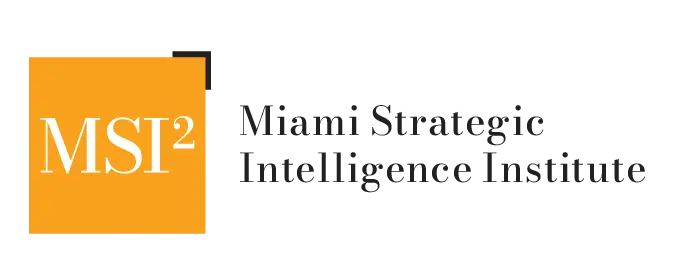01 May Carlos Fazio’s Media Assault on Marco Rubio
By,
Jesús Daniel Romero, Co-Founder and Senior Fellow, MSI² & William Acosta, SME
In April 2025, Uruguayan-Mexican journalist Carlos Fazio published an article on teleSUR titled “The Dirty Laundry of Marco Rubio,” accusing the current U.S. Secretary of State of corruption, ties to organized crime, and involvement in efforts to obstruct investigations into Venezuelan assets.
These allegations—presented without documentary evidence—came amid rising tensions between Washington and leftist governments in Latin America (Fazio, 2025a). This article examines Fazio’s political background, analyzes the contents of his publication, and assesses teleSUR’s role as a state-aligned media platform defending geopolitical interests.
Carlos Fazio’s Background and Militancy
Carlos Fazio was born in Montevideo, Uruguay, in 1948. He was a member of the Tupamaros National Liberation Movement (MLN-T), Uruguay’s most prominent urban guerrilla group during the 1960s and 70s. Within the MLN-T, Fazio worked on underground press and revolutionary propaganda. Persecuted by Uruguay’s military dictatorship, he went into exile—first in Argentina, then in Mexico—where he became a naturalized citizen and built a career as a journalist, author, and academic. His trajectory aligns ideologically with Marxist-Leninist movements and 21st-century Bolivarian regimes (El Viejo Topo, n.d.).

Analysis of the teleSUR Article
Fazio’s piece centers on Marco Rubio’s first 100 days as Secretary of State, accusing him of spearheading a hostile agenda toward the governments of Cuba, Venezuela, and Nicaragua via sanctions, blacklists, and support for opposition groups (Fazio, 2025a). However, the article goes beyond policy critique and veers into personal attacks—without verifiable documentation.
Among the most serious claims:
– Alleged embezzlement of CITGO assets
– Links to international money laundering
– Use of political influence to shield individuals under U.S. federal investigation
These accusations rely on anonymous sources and lack hard evidence. While former Congressman David Rivera, an ally of Rubio, has been federally charged for alleged unregistered lobbying on behalf of Venezuela (U.S. Department of Justice, 2022), no public evidence implicates Rubio himself. Rubio has acknowledged meeting with Rivera but denied any involvement in illegal activities (Fineout, 2022).
teleSUR’s Role: A Tool of Information Warfare
teleSUR, a media outlet funded by the governments of Cuba, Venezuela, and Nicaragua, has long been described by analysts as a state-aligned platform with an anti-U.S. narrative. The timing and promotion of Fazio’s article reinforce the view that this was a coordinated media attack aimed at undermining Rubio’s credibility just as his foreign policy initiatives are directly challenging the interests of Havana and Caracas.
The article’s content is aligned with these regimes’ strategic goals:
– Rejection of the reactivation of the U.S. Cuba Restricted List (Rubio, 2025)
– Opposition to oil-related sanctions on Venezuela (Paul Hastings LLP, 2025; Reuters, 2025)
– Rejection of U.S. support for Guyana in its territorial dispute with Venezuela
Geopolitical Context: Why Now?
This attack comes as Rubio pushes a new hemispheric doctrine that includes:
– Financial sanctions against authoritarian regimes
– Disruption of transnational organized crime networks
– Efforts to counter China’s influence in Latin America, particularly in Panama and the Caribbean (Rubio, 2025)
U.S. pressure has led to diplomatic and economic losses for Cuba and Venezuela, which may explain the timing of the publication. Although there is no direct evidence of coordination between Fazio and intelligence services, his ideological background, teleSUR’s editorial line, and the article’s narrative all suggest a shared goal: to discredit the political figure leading Washington’s regional offensive against the Bolivarian bloc.
Conclusion
Carlos Fazio’s article is best understood as a political propaganda effort disguised as investigative journalism. It strays from factual analysis and into unsubstantiated personal attacks, surfacing at a time when U.S. foreign policy is placing unprecedented pressure on authoritarian regimes in Latin America. teleSUR’s amplification of the piece supports the interpretation that it was a strategic communication maneuver to protect Cuba and Venezuela’s geopolitical standing in the face of Marco Rubio’s emerging leadership on hemispheric policy. Far from independent reporting, the article adopts a tone of ideological proselytizing, seeking to convert public opinion against Rubio through repetition, insinuation, and selective framing — all hallmarks of state-driven information warfare.
References
• Departamento de Justicia de EE. UU. (2022, December 5). Former member of Congress charged with acting as an unregistered agent of Venezuelan national. https://www.justice.gov/archives/opa/pr/former-member-congress-charged-acting-unregistered-agent-venezuelan-national
• El Viejo Topo. (n.d.). Carlos Fazio | Autores. https://www.elviejotopo.com/autor/carlos-fazio/
• Fazio, C. (2025a, April 26). Los trapos sucios de Marco Rubio. teleSUR. https://www.telesurtv.net/opinion/fazio-trapos-sucios-marco-rubio/
• Fineout, G. (2022, December 6). Rubio confirms he met with indicted ex-Florida lawmaker over Venezuela. Politico. https://www.politico.com/news/2022/12/06/marco-rubio-david-rivera-venezuela-meeting-00072652
• Paul Hastings LLP. (2025, February 3). Venezuela sanctions: Wind-down of General License 41 and introduction of secondary tariffs. https://www.paulhastings.com/insights/client-alerts/venezuela-sanctions-wind-down-of-general-license-41-and-introduction-of-secondary-tariffs
• Reuters. (2025, April 23). Venezuela launches Blend 22 crude exports ahead of U.S. licenses expiry. https://www.reuters.com/business/energy/venezuela-launches-blend-22-crude-exports-ahead-us-licenses-expiry-2025-04-23/
• Rubio, M. (2025, January 31). Restoring a Tough U.S.-Cuba Policy. U.S. Department of State. https://www.state.gov/restoring-a-tough-u-s-cuba-policy/
